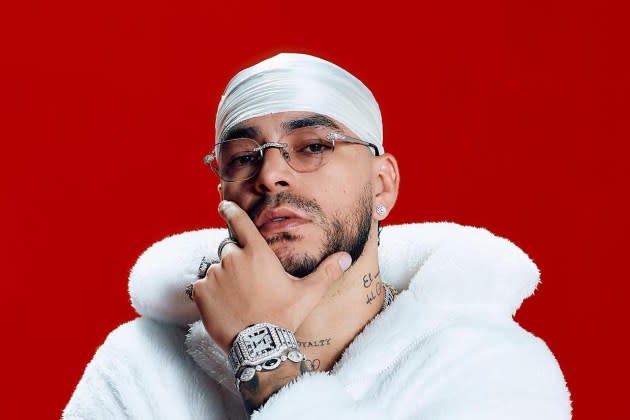From Street Busking to International Stardom: The Rise of Ryan Castro
- Oops!Something went wrong.Please try again later.
- Oops!Something went wrong.Please try again later.
- Oops!Something went wrong.Please try again later.

Ryan Castro has always been a go-getter. When the Colombian reggaeton singer was 17, he started busking in the streets and on the buses in Medellín. He’d carry a small stereo and join the throngs of vendors and performers that lined the tourist hub. A charismatic teenager with a bold timbre to match, Castro sang to earn a living and help support his family, but he was also saving up the small tips to record his own music one day. “I’ve always been set on what I wanted,” Castro, now 30, says over a Zoom call.
Castro is sitting in his living room, wearing a black snapback, a matching black turtleneck, and two chunky statement rings to complement the diamond bracelet and silver watch on his wrists. On the wall behind him are two framed platinum records for his international smash “Quema,” with April cover star Peso Pluma. “I’m grateful to have a song with Peso Pluma, who is one of the best Latin artists in the world right now,” Castro says. The reggaeton track became a massive hit, charting on the Billboard Hot 100 and showing another side to Peso Pluma beyond his signature Mexican corridos.
More from Rolling Stone
Castro says that their collaboration came from “the mutual respect and admiration we have for each other.” For him, that’s the most important ingredient for a successful collaboration: “When both artists respect each other, they work well and make good work,” he says.
“I’ve always listened to him, since before I was an artist,” Peso tells Rolling Stone, adding that when he wanted to know more about reggaeton, he went to Colombia to learn from Castro. “His music was a part of my nights out with my friends.”
Beyond linking up with Peso, Castro has collaborated with some of the biggest names in música urbana. Colombian singer Feid hopped on Castro’s 2021 track “Monastery,” Karol G invited Castro to open her 2021 Bichota Reloaded Tour in Medellín, J Balvin brought him onstage at the 2022 MTV VMAs, and Maluma recently tapped him for a track off his 2023 album Don Juan. With so much star power behind him, Castro is worlds away from the brave teen who sang in the streets for money. But every piece of his past continues to inform his art and career: “I want to carry it forever so I don’t forget where I come from,” Castro says.
His upbringing inspired his upcoming full-length debut album, El Cantante del Ghetto, which he describes as an ode to Pedregal, the humble neighborhood he grew up in. “They were my first fans, the first people who listened to me and I will always carry them in my heart,” he says. The LP builds off of the singer’s international merengue hit “Mujeriego,” from 2021, and the two EPs, Reggaetonera and Los Piratas, that followed the next year. His strength may be classic reggaeton that channels the early 2000s with party-ready percussion and signature airhorns, but Castro isn’t scared to experiment with other genres. On El Cantante del Ghetto, he fuses dancehall, rap, reggaeton, and “everything that shaped me.”
Born Bryan Castro Sosa, he was raised in Colombia’s second-largest city by his mother’s cousins and the neighborhood’s tight-knit community. “I’ve dreamt of being an artist since I was a kid,” he says. With the support of his friends from el barrio, Castro cultivated his creativity instead of turning to the high-level crime in his city. “I had many opportunities to do bad things to get money,” he says, hinting at the drug trade that dominated Medellín for decades.
But by the time he was 13 years old, Castro was more interested in the world inside his television screen. Biopics like Eminem’s 8 Mile and 50 Cent’s Get Rich or Die Tryin‘ fascinated the Colombian teen, who could identify with the rappers’ journey to lift themselves out of poverty through music. “Instead of picking up a gun, they picked up a pen to write,” he says. Soon, Castro followed suit, writing his own songs and uploading them to YouTube.
A few years after he started busking, Castro went to live with his mom in Curaçao. “I decided to experiment with other things and nourish myself with other music and cultures,” he explains. The Caribbean island brought influences like danzón and kizomba to his songs. In 2017, everything changed: His tropical love song “Morena” went viral in Colombia, amassing a new fan base back in his homeland. “I returned to Medellín from Curaçao and then I was already ‘a bit famous,’” he says, making quotes with his hands and laughing.
Castro gives credit to the Colombian artists who paved the way for him, especially those from Medellín like J Balvin, Karol G, Maluma, Feid, and Blessd.
“They made a path for us,” he says. “For us new Colombian artists, we can say we’re from the same land as Balvin and the whole world knows.”
Now that Castro has experienced his own taste of success, his eyes are set on the future. The singer’s main goals for his music and overall career are to leave a legacy and continue the cultural tradition of paying his fortune forward to other rising artists: “I want to work with the new generation too so that the genre can continue in Colombia.”
Best of Rolling Stone
